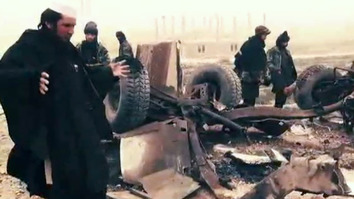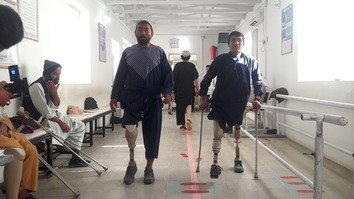KABUL -- Afghans are condemning the Taliban's recent demand that the International Committee of the Red Cross (ICRC) and the World Health Organisation (WHO) cease operating in Afghanistan, a move they say will put children and victims of the war at risk.
The Taliban on April 11 released a statement telling the two aid groups to shut down their work in Afghanistan without providing a specific reason.
"The war in Afghanistan has created a complex situation, and, in this challenging environment, some aid agencies are not planning their relevant activities appropriately," the statement said.
"Among them is the Red Cross that is not fulfilling their promises they agreed to with representatives of the [Taliban]; and, in addition to the security reasons, we have witnessed some suspicious activities from WHO during the implementation of the vaccination campaign," it added.
![An Afghan orthopaedic technician March 27 makes artificial limbs in a workshop at the International Committee of the Red Cross (ICRC) hospital for war victims and the disabled in Kabul. [Wakil Kohsar/AFP]](/cnmi_st/images/2019/04/19/17723-000_1f95hg-585_329.jpg)
An Afghan orthopaedic technician March 27 makes artificial limbs in a workshop at the International Committee of the Red Cross (ICRC) hospital for war victims and the disabled in Kabul. [Wakil Kohsar/AFP]
![Afghan bystanders gather outside the International Committee of the Red Cross (ICRC) Orthopaedic Centre in Kabul April 13. [Najibullah]](/cnmi_st/images/2019/04/19/17719-150957-585_329.jpg)
Afghan bystanders gather outside the International Committee of the Red Cross (ICRC) Orthopaedic Centre in Kabul April 13. [Najibullah]
The Red Cross has been operating in 17 Afghan provinces for the past 30 years.
Its services include providing support to prisoners of war, delivering orthopedic services to those disabled by war or birth defects, providing medical care to war survivors, delivering food and non-food aid, helping internally displaced persons and supplying potable water.
The Taliban briefly prevented the Red Cross from operating in Taliban-controlled areas for two months in 2018.
Meanwhile, WHO works closely with the Ministry of Public Health to run polio eradication campaigns throughout the country, in addition to its many other services in Afghanistan.
Committed to Afghans
ICRC officials say they are still committed to delivering services to Afghans affected by war.
"We have seen the statement on the website and are seeking to engage bilaterally and confidentially with the Taliban on it. At the same time, we have put our activities on hold around the country," Robin Waudo, a spokesman for the Red Cross in Afghanistan, told Salaam Times in a WhatsApp message.
"As we acknowledge this statement, we would like to say we remain committed to the people of Afghanistan who are affected by the armed conflict and need humanitarian assistance," it added.
WHO had no immediate comment.
The government is committed to ensuring security for aid workers, Interior Ministry spokesperson Narat Rahimi told Salaam Times.
"The Red Cross is an impartial humanitarian agency, and the enemies of Afghanistan once again have proved that they're putting an obstacle in front of relief and humanitarian assistance," he said, referring to the Taliban statement.
"We will always co-operate with ensuring their security."
In contrast, the Taliban allow aid only when it stands to benefit them.
Just a week after the Taliban's denunciation of the ICRC and WHO, the militants called on "aid organisations, NGOs and humanitarian institutions to not hold back from any aid" to victims of recent floods, the Taliban tweeted April 17.
If the Taliban can fund its war against the government, it could also help those in need, a number of social media users pointed out.
Public anger toward the Taliban
Civil society activists and other citizens in Afghanistan have condemned the Taliban's decision.
Sima, a 55-year-old Afghan woman who came to Kabul's ICRC-run Orthopedics Centre with her five-year-old grandchild for treatment for a congenital disability, expressed her anger with the Taliban.
"Our people haven't seen anything good from the Taliban other than their atrocities and bloodshed," Sima told Salaam Times under a pseudonym.
"The Red Cross has helped us for years. Now, the Taliban want to ban this agency's work so that our children die of their disabilities," she said.
"With God's help and the efforts of doctors in this Red Cross hospital, my grandchild has gotten much better," Sima added.
Muhammad Naeem, 48, whose seven-year-old son was shot in the back and now is paralysed from the waist down, was also at the Red Cross rehabilitation centre in Kabul for treatment.
He praised the services provided by the ICRC.
"The war and the Taliban paralysed my child, and now that the Red Cross treats him for free, the Taliban are not allowing it to operate," he said.
Against the public interest
"Unfortunately, this decision of the Taliban is against the public interest, similar to the groups' other activities, because the work of the Red Cross and WHO is vital for Afghans," Muhammad Amin Nazari, a civil society activist in Kabul, told Salaam Times.
The Red Cross supports orthopaedic hospitals in Afghanistan that provide free medical care to Afghans with disabilities, he noted.
"The Red Cross and WHO have a bright past of delivering services in Afghanistan," Fayezah Hassani, another civil society activist in Kabul, told Salaam Times.
"The Taliban's decision will, unfortunately, deprive children of polio vaccination, and this puts children at risk of paralysis from polio and ruins their future."
Since the beginning of 2019, medics have reported one polio case in Uruzgan and two in Kandahar, both in areas that are insecure or controlled by the Taliban, according to the Ministry of Public Health.
The government tries to deliver equal health services to all Afghans, Wahidullah Mayar, spokesperson for the Ministry of Public Health, told Salaam Times.
"Anti-government groups several times prevented polio vaccination campaigns in the past, but we had been able to resolve the issues with the help of elders and tribal leaders," said Mayar.
"We try to keep health services separate from politics, and political rivalries should not prevent the delivery of health services."

![Afghan men wearing prosthetics, after losing their legs in land mine explosions, sit at the International Committee of the Red Cross (ICRC) hospital for war victims and the disabled in Kabul March 27. [Wakil Kohsar/AFP]](/cnmi_st/images/2019/04/19/17724-000_1f95hv-585_329.jpg)







It is clear that Taliban want to disgrace the name of Afghanistan, and similarly, their father Pakistan tells them that even if a persona has a minor pain, he should be taken to Pakistan because now Pakistan ('s economy) is going down.
Reply1 Comment